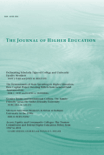
JOURNAL OF HIGHER EDUCATION
Scope & Guideline
Exploring transformative ideas for educational excellence.
Introduction
Aims and Scopes
- Equity and Inclusion in Higher Education:
The journal consistently examines themes related to equity, access, and inclusion, particularly for underrepresented groups in higher education, including racial minorities, first-generation students, and marginalized communities. - Impact of Policy on Higher Education:
Research published in the journal often investigates the effects of educational policies, funding models, and institutional practices on student outcomes, highlighting the intersection of policy and educational equity. - Student Experiences and Success:
A significant focus is placed on understanding student experiences, mental health, and factors influencing academic success, particularly for non-traditional and diverse student populations. - Institutional Change and Leadership:
The journal explores institutional dynamics, leadership practices, and organizational change efforts aimed at fostering equity and improving educational outcomes. - STEM Education and Workforce Development:
There is a strong emphasis on STEM education, including studies on student pathways in STEM fields, the role of interventions, and the impact of financial aid on students' choices. - Qualitative and Mixed-Methods Research:
The journal publishes a variety of methodological approaches, with a notable presence of qualitative and mixed-methods studies that provide rich, nuanced insights into higher education issues.
Trending and Emerging
- Mental Health and Well-Being:
Recent publications emphasize the importance of mental health support for students, particularly in light of the COVID-19 pandemic, highlighting the need for institutional responses to student well-being. - Diversity, Equity, and Inclusion Initiatives:
There is an increasing focus on examining the effectiveness of diversity and inclusion initiatives within institutions, exploring how these efforts contribute to equitable educational outcomes. - Impact of COVID-19 on Higher Education:
Research investigating the long-term impacts of the COVID-19 pandemic on educational practices, student engagement, and institutional operations is trending, as institutions adapt to new realities. - Intersectionality in Higher Education:
Emerging studies are increasingly exploring intersectional identities and their implications for student experiences and institutional practices, reflecting a broader understanding of diversity. - Online and Hybrid Learning Models:
The shift to online and hybrid learning environments has prompted a surge in research addressing the effectiveness, accessibility, and equity of these educational formats in higher education.
Declining or Waning
- Traditional Metrics of Academic Success:
There is a noticeable decline in research centered solely around traditional academic metrics such as standardized testing and GPA, as the journal increasingly prioritizes holistic approaches to student success. - General Studies on Institutional Reputation:
Studies focusing exclusively on institutional reputation without addressing equity or student outcomes are becoming less common, indicating a shift toward more impactful research that emphasizes social justice. - Contentious Debates on Affirmative Action:
While still relevant, discussions solely focused on affirmative action policies are less frequent, as the journal pivots towards broader discussions of systemic inequities and their implications in higher education. - Single-Dimensional Analyses of Faculty Roles:
Research that only examines faculty roles in isolation, without considering the broader institutional context or systemic issues, appears to be waning, as the journal encourages more integrative studies. - Historical Perspectives on Higher Education:
There is a decreasing emphasis on purely historical analyses of higher education systems, with more focus being directed towards contemporary issues and future-oriented research.
Similar Journals
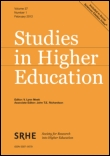
STUDIES IN HIGHER EDUCATION
Leading the Conversation on Higher Education Challenges and SolutionsStudies in Higher Education is a premier academic journal published by Routledge Journals, Taylor & Francis Ltd, focusing on the dynamic and evolving landscape of higher education. With an illustrious history spanning from 1976 to 2024, this journal is ranked in the top quartile of education journals (Q1) and holds an impressive Social Sciences Educational Scopus rank of #49 out of 1543, placing it in the 96th percentile. This makes it an invaluable resource for researchers, educators, and policymakers seeking to understand and shape the future of higher education. Through rigorous peer-reviewed articles, the journal covers the multifaceted aspects of higher education, including pedagogical innovations, policy analysis, and institutional challenges. While it does not currently operate under an open-access model, access to its rich repository of research ensures that stakeholders in academia can stay at the forefront of critical discussions and transformative practices in education. The journal’s impact within the field underscores its commitment to advancing knowledge and fostering scholarly dialogue, making it a must-read for those dedicated to improving educational outcomes.

Canadian Journal of Higher Education
Fostering Collaboration for Transformative Educational PracticesThe Canadian Journal of Higher Education, published by the Canadian Society for the Study of Higher Education, is a pivotal platform in the field of higher education research. Since its inception in 1971, this Open Access journal has championed the dissemination of innovative and impactful scholarly work that contributes to the understanding and advancement of higher education in Canada and beyond. With a commitment to accessibility, it ensures that researchers, professionals, and students can engage with high-quality research without barriers. The journal serves as a critical resource for those interested in policy analysis, pedagogical practices, and the socio-economic dimensions of higher education, fostering dialogue and collaboration among academics and practitioners. By promoting rigorous and diverse examinations of issues facing post-secondary education, the Canadian Journal of Higher Education plays an essential role in shaping the landscape of academic discourse in this vital field.

Innovative Higher Education
Transforming education through innovative research.Innovative Higher Education, published by SPRINGER, stands as a leading academic journal in the field of educational research, focusing on transformative practices and new methodologies within higher education contexts. With an impressive Q1 rating in the prestigious Education category and a prominent Scopus ranking of #337 out of 1543 in Social Sciences, this journal offers a vital platform for research that enhances pedagogical innovation and academic policy discourse. Since its inception in 1983, the journal has successfully navigated the evolving landscape of higher education, providing insights and empirical evidence that resonate with researchers, academics, and practitioners. While the journal is not currently open access, it remains essential for those dedicated to advancing educational excellence and reform. The ISSN for print is 0742-5627, with an E-ISSN of 1573-1758, ensuring robust visibility for published articles on a global scale. As the landscape of higher education continually evolves, Innovative Higher Education is committed to fostering dialogue and sharing knowledge that drives innovation and improves learning outcomes.
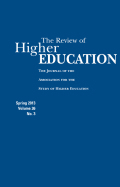
REVIEW OF HIGHER EDUCATION
Transforming Insights, Shaping Futures in Higher EducationREVIEW OF HIGHER EDUCATION is a premier academic journal published by Johns Hopkins University Press, focusing on the dynamic field of higher education research. With an ISSN of 0162-5748 and an E-ISSN of 1090-7009, this journal operates without Open Access, ensuring a curated selection of high-impact research contributions. Based in the United States, at Journals Publishing Division, 2715 North Charles St, Baltimore, MD 21218-4363, the journal has established a significant presence since its inception in 1996, converging rigorous scholarship into practical insights for educational policy and practice through 2024. In the realm of education, it proudly ranks within the top quartile (Q1) of journals and is recognized in the Scopus rankings as #379 out of 1543 in the Social Sciences: Education category, placing it in the 75th percentile—a testament to its influence and reach. The journal's objectives center around promoting innovative research that informs and transforms higher education systems, making it an invaluable resource for researchers, professionals, and students dedicated to advancing the discourse in this vital area.
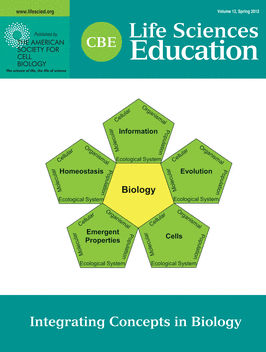
CBE-Life Sciences Education
Elevating Life Sciences Education through Innovative Research.CBE-Life Sciences Education, published by the American Society for Cell Biology, is a premier academic journal that bridges the fields of education and life sciences. With a robust impact factor reflected in its prestigious Q1 ranking in both Biochemistry, Genetics and Molecular Biology and Education categories in 2023, this journal is pivotal for researchers and educators alike. Its mission is to enhance learning and pedagogy across the biological sciences, fostering innovative educational practices that elevate the teaching and understanding of complex biological concepts. With a convergence of rigorous research and practical insights, CBE-Life Sciences Education serves as an essential resource for professionals and students committed to advancing life sciences education. The journal is available through traditional subscription, ensuring access to a wide array of valuable articles from 2006 to the present and beyond.
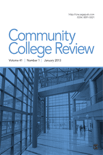
Community College Review
Empowering Voices in Community College ScholarshipCommunity College Review, published by SAGE Publications Inc, is a leading peer-reviewed academic journal dedicated to the exploration of community college education, policy, and practice. With its ISSN 0091-5521 and E-ISSN 1940-2325, this esteemed publication contributes significantly to the field of education, attaining a distinguished Q1 classification in the 2023 Education category and ranking #681 out of 1543 in the Scopus Social Sciences - Education rankings, placing it in the 55th percentile overall. Since its inception in 1973, the journal has evolved to address the complex challenges and trends in community colleges, making it an invaluable resource for researchers, practitioners, and policymakers striving to enhance educational outcomes. While not an open-access publication, Community College Review ensures rigorous scholarly standards, fostering a vibrant dialogue on the future direction of community colleges in America. Its insightful articles and critical analyses serve to advance the study and practice of education at these vital institutions.
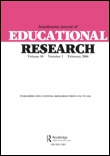
Scandinavian Journal of Educational Research
Illuminating the diverse landscape of education across Scandinavia.The Scandinavian Journal of Educational Research is a premier academic publication dedicated to advancing the field of education through rigorous research and comprehensive analysis. Published by Routledge Journals, Taylor & Francis Ltd, this journal has established itself as a vital resource for educators, researchers, and policymakers, especially with its notable Q1 ranking in the Education category and its impressive Scopus ranking of 242 out of 1543 in the realm of social sciences. With its ISSN: 0031-3831 and E-ISSN: 1470-1170, the journal encompasses a diverse range of topics, reflecting on educational theory, practice, and policy across the Scandinavian context and beyond. Featuring contributions from esteemed scholars, the journal fosters insightful dialogues and innovative solutions to contemporary educational challenges. With convergence spanning from 1971 to 2024, it remains an indispensable part of the academic landscape for those keen to explore the multifaceted nature of education.
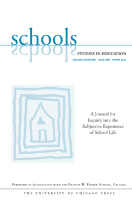
Schools-Studies in Education
Navigating the Future of Education Through ResearchSchools-Studies in Education is a premier journal published by University of Chicago Press, dedicated to advancing the field of education through rigorous research and thoughtful discourse. With its strong commitment to academic excellence, the journal serves as a vital platform for presenting innovative studies and scholarly articles that address key issues in educational theory, policy, and practice. Though currently not listed as an open-access journal, it offers a wealth of knowledge that is crucial for researchers, educators, and practitioners keen to explore contemporary challenges and developments in the educational landscape. By providing a forum for both empirical studies and theoretical explorations, Schools-Studies in Education remains indispensable for anyone aiming to enrich their understanding and practice in the field of education.
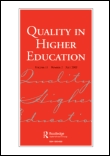
Quality in Higher Education
Championing Quality, Empowering InstitutionsQuality in Higher Education is a premier journal dedicated to the critical examination of quality assurance and enhancement in higher education. Published by Routledge Journals, Taylor & Francis Ltd, this esteemed journal boasts a Q2 ranking in the Education category on Scopus, reflecting its significant contribution to the field, with a ranking of #483 out of 1543 in Social Sciences: Education and placing in the 68th percentile. With an ISSN of 1353-8322 and an E-ISSN of 1470-1081, the journal spans a diverse range of topics pertinent to educational researchers and practitioners from 1995 to 2024. It serves as an invaluable platform for innovative research, case studies, and critical discussions aimed at fostering effective quality practices in higher education institutions. Although it does not currently offer open access, the journal ensures academic rigor and relevance, making it a vital resource for those seeking to elevate the standards of educational quality globally.

Yuksekogretim Dergisi
Fostering Knowledge and Collaboration in Education.Yuksekogretim Dergisi, published by TUBA-Turkish Academy of Sciences, is a pivotal platform in the field of higher education research, offering a critical lens on innovative educational practices, academic policies, and pedagogical advancements. Although specific impact metrics such as H-Index and Scopus ranks are currently unspecified, the journal's commitment to publishing high-quality, peer-reviewed articles positions it as a significant contributor to the discourse surrounding higher education in Turkey and beyond. With an ISBN of 2146-796X and an E-ISSN of 2146-7978, Yuksekogretim Dergisi invites researchers, professionals, and students to engage with contemporary issues in the realm of university education, explore scholarly insights, and contribute to the evolving practices within the academic landscape. The journal serves as an Open Access resource, enhancing accessibility to knowledge and fostering a collaborative educational environment.